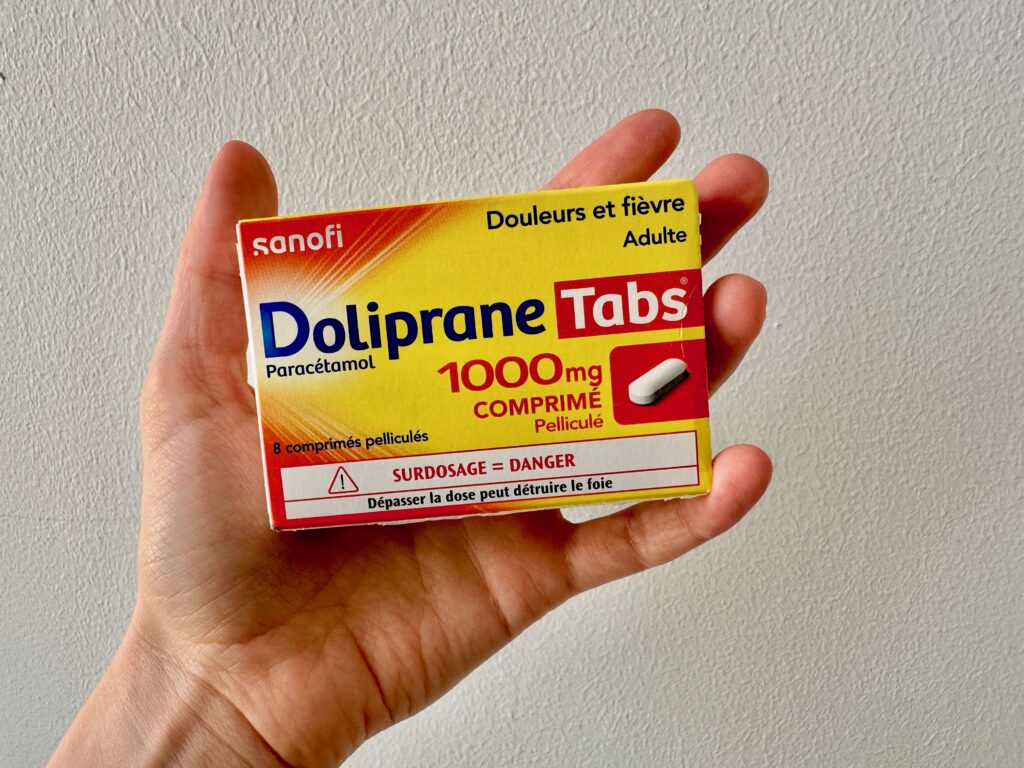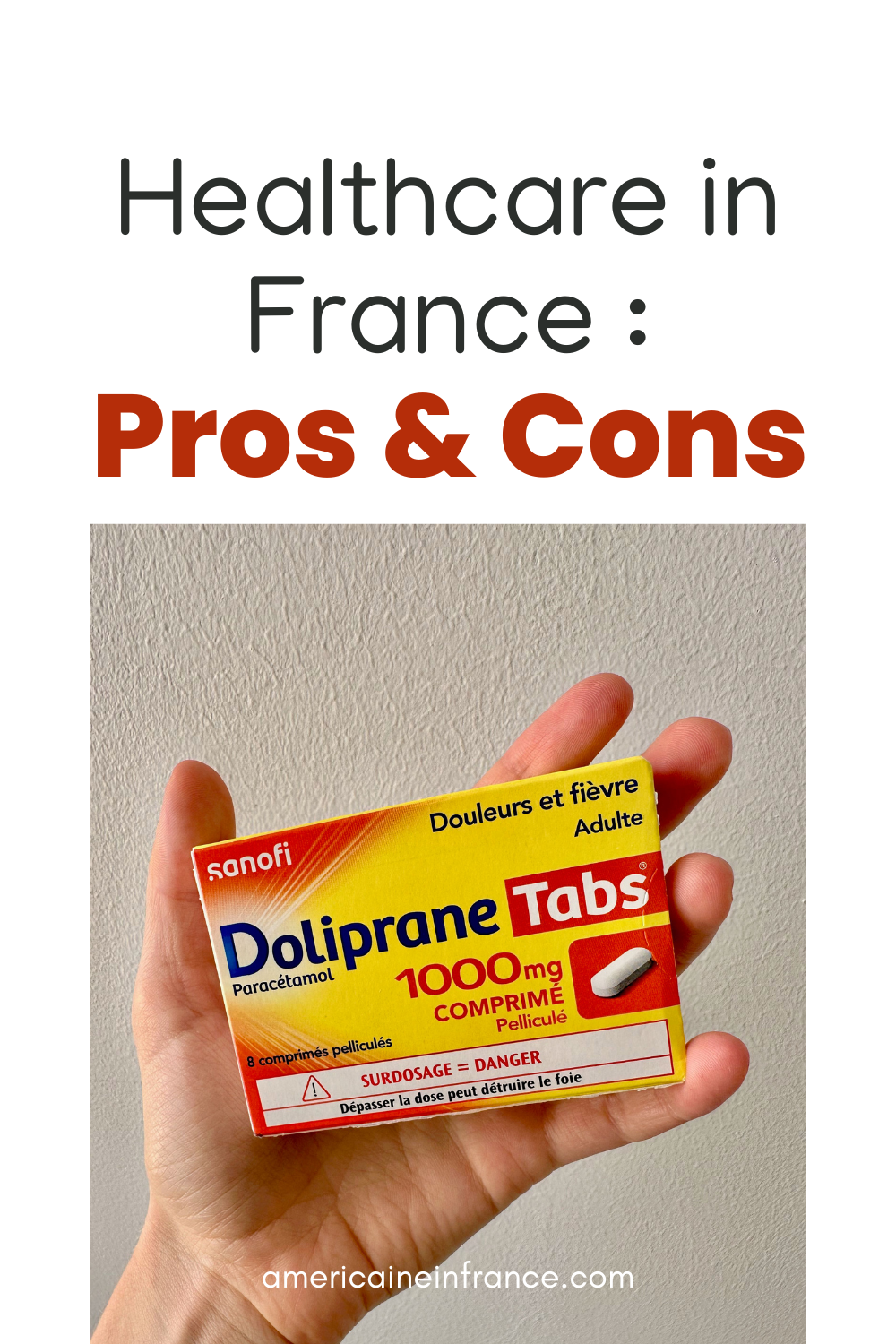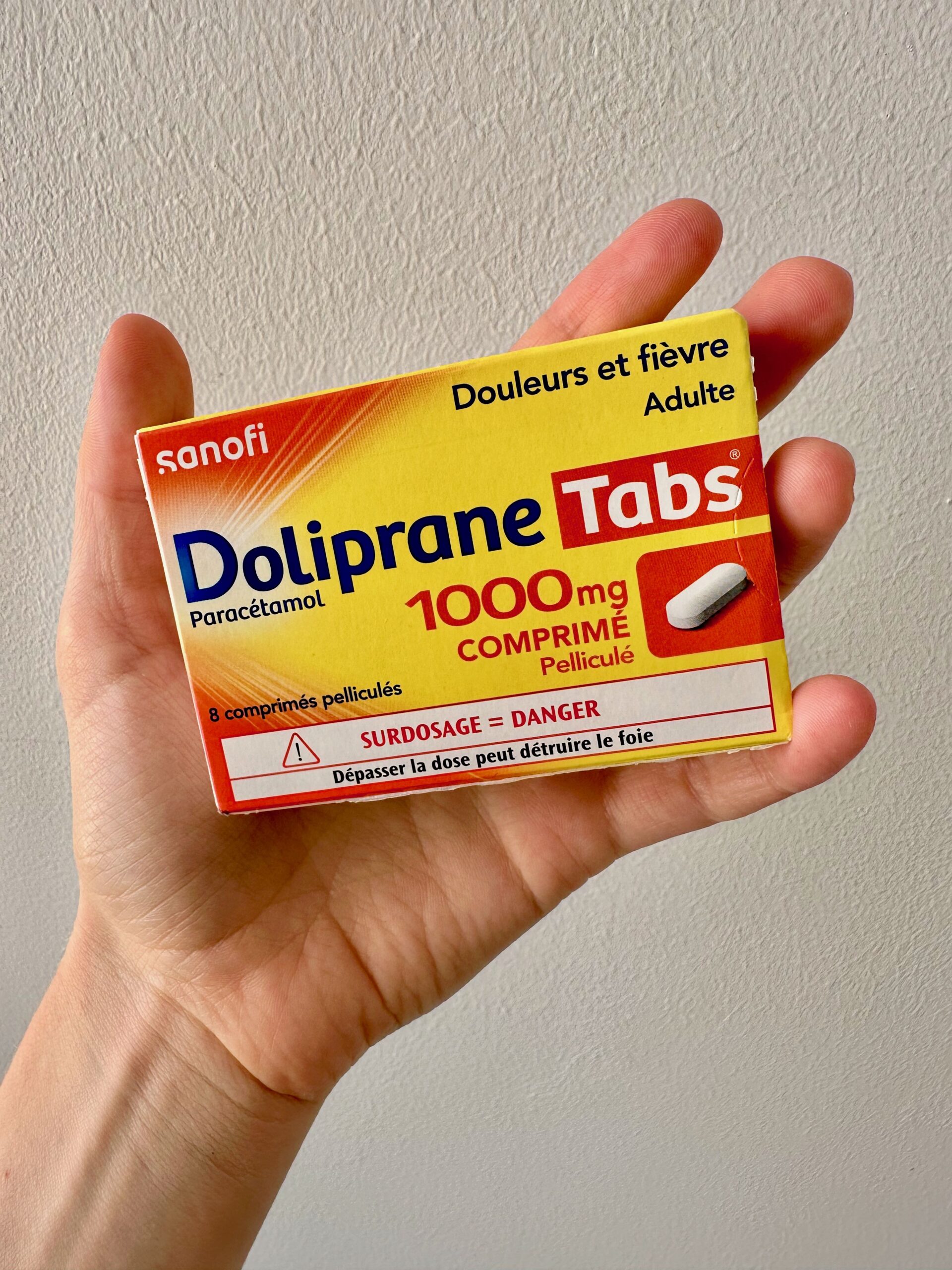This post may contain affiliate links, meaning that if you click and make a purchase, I may earn a commission at no additional cost to you. Read the full disclosure here.
France’s healthcare system is regularly touted as one of the best in the world. Is healthcare in France really so great or is the universal public insurance clouding our judgment? Let’s take a look at the pros and cons!

Pros to Healthcare in France
- Equal access for all residents: Generally speaking, if you legally reside in France on a continuous, stable basis, you can enroll in the French healthcare program (assurance maladie). This basic healthcare coverage (Protection universelle maladie—PUMA) is not dependent on having a job. You also do not pay a higher premium if you are older or have preexisting conditions. If you work, a percentage of your income is put towards social charges, one of which is the socialized public healthcare system in France.
Before moving to France, I quit my teaching job. It was so eerie knowing that the healthcare coverage provided through my work would expire while I was still in the United States.
- Regulated pricing & transparency: The government regulates the rates for consultations, procedures, and medications. Base rates are relatively low and can be found on the Ameli website. For example, a consultation with a general practitioner is currently 26,50€. Health professionals can work outside of the set pricing, but in all cases, they are required to clearly disclose their rates. It’s great knowing what to expect!
💡 Did you know? Even tourists can go to the doctor and they’ll be charged the same rate as anyone else. They just won’t receive any reimbursement.
- Universal acceptance throughout France: When looking for a healthcare provider in France, there’s no need to navigate in-network or out-of-network providers and centers. This concept doesn’t exist in France. Likewise, you don’t need to check in advance if your insurance will be accepted by a particular doctor. You may receive varying levels of reimbursement based on whether the practitioner charges the base rates (secteur 1) or if they charge higher rates (secteur 2 or secteur 3 non conventionné).
- “Extra” things are more accessible: During my pregnancy and afterward, I saw an osteopath for back pain. While breastfeeding, I reached out to a lactation consultant for support. Neither of these support professionals are reimbursed by la sécu, which is the case for anything considered “alternative medicine.” However, their rates were relatively affordable despite being unregulated, so I didn’t hesitate to book an appointment. If I had given birth in the United States, I probably would not have sought out these health professionals because I would have been too concerned about the additional costs incurred on top of the cost of giving birth.
- Short, to-the-point consultations: Most general doctors and even many specialists keep their regular appointments to 15 minutes. The short appointment duration can be seen as a pro or a con depending on your outlook and I do see both sides! Overall, I appreciate the no-frills aspect and the fact that you spend the entire appointment with the doctor.
- Pick up meds at any pharmacy: You can stop by any pharmacy in France with your prescription (ordonnance) and walk out a few minutes later with your meds in hand. Medications are not counted out and put into bottles here. They give you the whole box or bottle, explain the dosage, and often scribble a little note on the outside. It’s quick and convenient! If they don’t have something in stock, they can order it for you or you can just head to another pharmacy if it’s something you can’t wait for.

- Advice from pharmacists: Pharmacy technicians in France are highly trained and can give medical advice for common ailments. If they are unable to assist you, they will advise you to consult a doctor or go to the hospital, as needed. You might find it a bit uncomfortable at first describing your UTI while other clients are waiting in line right behind you, but ultimately, I find it reassuring to be able to go to a pharmacist for things like this.
Read More: Things You Can Do in France That You Can’t Do in the United States
- Appointment booking ease: Many health professionals in France forgo a secretary in favor of subscribing to an online booking system. This makes it easy to find doctors, especially based on availability. You can also use this interface to exchange documents (such as prescriptions) or have a teleconsultation. Doctolib is one of the most well-known platforms, and France can barely take credit for this one as it was a startup idea and not the government itself.
Cons to Healthcare in France
- Paying more into the system: Payment into the healthcare system is calculated according to your situation and income. Some people contribute quite a lot while others may get the benefits without paying at all. Paying more into the system compared to others can be frustrating when you know that there are people taking advantage of the system and/or not participating when they could be. It might feel unfair.
- Necessity of supplementary insurance: Private top-up insurance, known as a mutuelle, is absolutely essential, in my opinion. It’s important to note that the cost of going to the doctor is not fully covered by the national healthcare program.
As a general rule of thumb, you are reimbursed 70% of medical costs and are therefore responsible for the remaining portion. Although costs are relatively low, fees add up quickly! Additionally, dental and eye care do not seem to be reimbursed very well and alternative medicine (including therapy with a psychologist) is not reimbursed at all. That being said, largely, people aren’t going into medical debt or avoiding the care they need because they can’t afford it.
👉🏻 In the market for a top-up insurance in France? Not sure where to start looking? An insurance broker can help you find affordable solutions based on your specific situation. I recommend contacting Fab French Insurance to compare your options! Their small team is dedicated to providing personalized support.

- Rushed appointments: As mentioned earlier, 15-minute consultations are the norm. Chatting with the dermatologist, stripping for the exam, and settling payment in the space of 15 minutes is certainly a thrill for first-timers. Add in needing to communicate in a second language and you might get a bit flustered. I may be exaggerating a bit on this one, but it does often seem like you’re in and out of the doctor’s office very quickly.
- Shortage of health professionals: Getting an appointment can be difficult depending on where you live in France. Not all doctors accept new patients, especially in more rural areas where the demand is higher in proportion to availability. This is particularly frustrating since it’s necessary to declare a médecin traitant (primary care physician) in order to receive full reimbursements. More specialists are available in cities but wait times can be long. It’s common knowledge that the wait for a dermatologist is over 6 months and you’ll likely need to call around.
- Inefficient parcours de soins: In order to be fully reimbursed for care, you need to follow the parcours de soins by first consulting your médecin traitant who then prescribes the next steps such as directing you to a specialist, if needed.
At best, the approved healthcare pathway can add unnecessary wait times to treatment. At worst, some general doctors are not always up to date on the most current practices, so they may not give you the best options. A couple of years ago, my ear was blocked with earwax and a general doctor used the outdated technique of blasting water into my ear instead of just referring me to an ear, nose, and throat doctor for a quick and simple vacuum extraction. Spoiler alert: I got an ear infection.
- Complicated, slow system: In a classic case of French bureaucracy at its finest, the system isn’t set up in a user-friendly way. There are still quite a lot of tasks that can’t be completed electronically, forcing you to send documents by mail. All of this paper shuffling means that enrollment documents may be lost, maternity leave may be delayed, or healthcare reimbursements might take a while to show up in your bank account.
- Misleading initiatives: Certain initiatives sound good on paper but are very limited in reality. I was quite intrigued when I heard about the Mon soutien psy initiative which allows people to benefit from 12 psychotherapy sessions over the course of a year. Since therapy is typically paid completely out of pocket in France, I was happy to hear that this would make it more accessible. However, due to the low rate (50€/session), few therapists partner with this program as they could charge more outside of it. One can imagine that those who choose to participate are generally the ones without a client base and perhaps for good reason.

- Lack of customer service: With costs kept low, in my opinion, there’s simply no incentive for health professionals to provide customer service. Of course, there are health professionals who go above and beyond, but it’s not what I’ve come to expect here. This may also be particular to Paris and other big cities where medical professionals’ expenses are higher.
For example, at the pharmacy, I was measured for compression tights but they gave me the wrong size. I didn’t figure this out until I had washed them and tried putting them on. Jonathan and I discussed ahead of time what the outcome might be if I went back to the pharmacy with them. Shocker—the Frenchman was correct. While there might be a pharmacy out there that would do a commercial gesture, this one said I needed to get a new prescription in order to get a new (no charge to me) pair of tights, even though they conceded that I should have been given a bigger size based on my measurements!
While reflecting on my experiences with the healthcare system in France, I managed to come up with an equal number of advantages and disadvantages. However, many of the items on the cons list are simply small inconveniences. Some of the pros, I think, hold far more weight in comparison.
Overall, I feel extremely fortunate to be able to participate in France’s healthcare system and I’m very happy with the quality of care that I’ve received.
What are your thoughts regarding these pros and cons to French healthcare? Did I miss anything worth mentioning?





my thoughts, indeed it is super cheap and there’s no concern of a medical condition bankrupting a person, but. the system here is not at all sophisticated or elegant IMO. The lack of doctors in areas is concerning and I’m going on almost 3 years with no médecin traitant, I’ve had to go to Barcelona for dermatology due to the wait times…. but it works and it’s super cheap and there’s solidarity and equity which is alot.
Valid points! I appreciate you sharing your experience.
Great post! I feel like this is a very fair breakdown of what ‘free’ healthcare is actually like. Being back in the US I’m definitely frustrated by how complicated it is the understand insurance/pricing of care and we have similar issues with appointment availability in a big city. BUT in general I think I personally would rather pay more for what I feel like is considerably better/more thorough care.
“Free” healthcare is certainly a nuanced topic. Thanks for chiming in with your perspective!